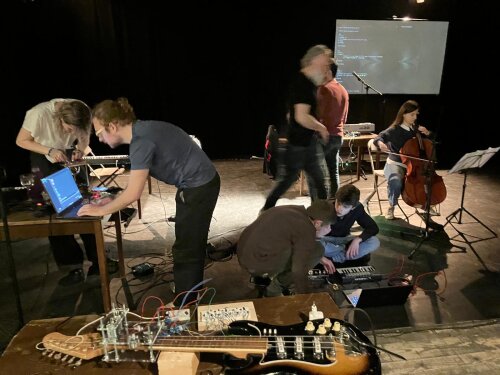23 & 24 March 2026 - Royal Conservatoire Antwerp
Initiated by Umut Eldem, Giusy Caruso, Sara Simionato, Dago Sondervan

The fifth edition of the Convergence seminar will focus on technological co-creation in interdisciplinary arts. Researchers, artists, and anyone currently engaging with this subject are invited to share their practices, experiences, and historical perspectives. Lectures, performances, workshops, and installations are welcome. The seminar will take place on March 23th and 24th 2026 at Royal Conservatoire Antwerp, Belgium. Our topics for this year are:
Anthropomorphizing Artistic Technology:
Humans have the tendency to assign human-like qualities to non-human entities, especially when the entities are perceived to act in a human-like manner. This has historically been the case with technology that interacts with and outputs semantic information, resulting in what has been called the “ELIZA effect”. The recent personification of Large Language Models (such as ChatGPT) is an example of this tendency. The use of technologies that semi-autonomously generate musical output (such as Agentic AI, ALife, and nonlinear dynamical systems) may give rise to the perception of an anthropomorphized "being": A thing that appears to make musical choices and exhibit musical intentionality. This opens up questions about the nature of authorship, autonomy, and relationality in technological co-creation.
- In which ways does the anthropomorphization of musical technology influence the creative process?
- Which creative and performative strategies emerge when the personified nature of semi-autonomous technology is embraced?
- When agency is distributed between human and machine, who (or what) is expressing itself?
Embodied Co-Creative Practices:
The application of AI models opens up diverse creative possibilities, particularly in the realm of music performance and improvisation. However, these innovations also prompt critical reflection on the role of the body, not merely as a passive medium, but as an active site of interaction, interpretation, and improvisation. In co-creation between human and AI, it becomes essential to understand the limitations and potential of embodiment.
- How does musical AI reshape embodied performance practices?
- How do musicians adapt their responses within this expanded practice?
- Which frameworks or methodologies are possible to ensure that human-AI co-creations are both ethically sound and embodied?
New Frameworks in Improvisation and Real-time Creation:
The improvements in computing power and accessibility of musical AI lead to new technologies that can respond and adapt to musical information in real time; in parallel, real-time interactive systems invite new forms of interdisciplinary improvisation, creating bridges between music, movement and visual arts. In artistic practices that prioritize improvisation (jazz, live coding, folk-based music, contact improvisation, and live visuals), such technologies open up new avenues in co-creative musical approaches.
- In which novel ways are existing artistic practices modified with the addition of responsive technologies?
- What are the possible roles of real-time co-creative technologies in the performance practice?
- Which artistic and academic frameworks are possible in dealing with unexpected or chaotic responses from a non-human, technological agent?
Programme
22 March - Opening Concert - De Theatergarage
18:00 | Opening Concert – Works from CREATIE researchers and students
23 March - Day 1 – Royal Conservatoire Antwerp, Gele Zaal
- 11:00 – 12:00 | Morning Reception (Tea & Coffee)
- 12:00 – 12:15 | Introduction
- 12:15 – 13:15 | Keynote 1: Alexander Schubert
- 13:15 – 14:00 | Lunch Break
- 14:00 – 14:30 | Presentation 1: Daniel Lythegoe - 'Interpreting Graphic Scores: The Computer as Performer'
- 14:30 – 15:00 | Presentation 2: Davide Paolillo - 'Entangled Rawness: chaos-shaped relations with the no-input mixer'
- 15:00 – 15:30 | Presentation 3: Serkan Sevilgen - 'Re-Coupling Gesture and Sound in Digital Musical Instruments: A Timbre-Driven Mapping Strategy'
- 15:30 – 16:00 | Coffee Break
- 16:00 – 16:30 | Presentation 4: Cecilia De Lazzaro & Gianmarco Canato - 'Improvisatory Co-Creation between Voice and Field Recording through SOMAX 2 Concatenative Synthesis'
- 16:30 – 17:30 | Keynote 2: Chris Kiefer
Evening Concert
19:00 – 20:00 | 'The Nest', Ferdinando Romano
24 March - Day 2 – Royal Conservatoire Antwerp, Gele Zaal
- 12:00 – 12:45 | Reception (Tea & Coffee) & Introduction
- 12:45 – 13:15 | Presentation 5: Furkan Ak - 'Ghostly Places : Spectral Traces in Urban Nightlife'
- 13:15 – 13:45 | Presentation 6: Paolo Piaser & Hao-Teng Liu - 'A systemic framework for co-creative interpretation with algorithmic digital autonomous agents'
- 13:45 – 14:45 | Lunch Break
- 14:45 – 15:15 | Presentation 7: Patricia Alessandrini - 'Vospora: An Empathetic Singing Soft Robotic Creature as Co-Creative Agent in Real-Time Performance'
- 15:15 – 15:45 | Presentation 8: Maria Lugiia Gioffre - 'Scoring Scrolling'
- 15:45 – 16:15 | Coffee Break
- 16:15 – 16:45 | Presentation 9: Elena Ajani & Massimiliano De Rose - 'have you ever thought about seeing your emotions dance?'
- 16:45 – 17:30 | Presentation 10: Jonathan Impett & Juan Parra Cancino - 'Three States of Wax: metaphor and model in a hybrid environment for improvisation'
Practical
- Location opening concert: Theatergarage, Bouwhandelstraat 72, 2140 Antwerpen
- Location seminar: Gele zaal, Royal Conservatoire Antwerp, Desguinlei 25, 2018 Antwerpen
- Registration: please use the button below